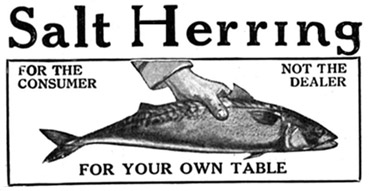|


In Eastern Europe
herring was the cheapest fish. It arrived presalted in barrels from Norway,
Holland, England and Scotland. Jews were prominent in the herring trade,
importing and transporting the fish by rail to Germany, Poland and Russia
and selling it in stores and from pushcarts. This poor man's food —
turned rich man's delicacy — was an all-important
part of the diet of the Jews. In the 1920's the Polish-French gastronome
Edouard de Pomiane wrote that the Jews of Poland ate a herring a day.
According to the British columnist Chaim Bermant, in England it was much
the same story. He reminisced in one of his articles, "On Sunday
one had a pickled herring, on Monday soused herring, on Wednesday baked
herring, on Thursday herring fried in oatmeal and Friday herring in sour
cream."
Herring remains one
of the great Jewish favorites. Fishmongers, delis and supermarkets in
many areas of London offer a variety of pickled and marinated herrings
and the salt-cured fish, which needs to be soaked and desalted before
it can be prepared.
Schmaltz herring is
cured by being covered with coarse salt and left with a weight on top
for up to four days. Before it can be used, it needs to be soaked for
as long as one or two days in a few changes of water to remove the salt.
Matjes herring is preserved in brine and is relatively fresh, so it usually
needs no more than one hour's soaking. My fishmonger gets matjes from
Holland and skins and fillets it for me. They are my favorite, and particularly
delicious when they have been soaked in milk instead of water.
Once filleted, skinned
and soaked, herrings can be eaten as they are, raw, simply dressed with
oil and a squeeze of lemon or smothered in sour cream or crème
fraiche with a little lemon or a touch of sugar, accompanied by bread
or a hot boiled potato. Salt herrings are usually eaten with onion rings.
The onion's strong flavor can be muted by sprinkling with plenty of salt
and letting the juices drain for one hour, or by pouring boiling water
over them and adding a little lemon juice or vinegar. I can understand
that you might easily become addicted to herring. You can keep desalted
herring in a jar covered with olive oil. Cut them diagonally into two-inch
(five-centimeter) pieces or leave them whole.
|
MARINATED
HERRING
serves
6-8

When
you buy salt herring, find out from the merchant how much soaking
it needs. Matjes need only 1 hour.
4 salt herrings,
filleted and soaked as required
1 large onion, sliced
1 ½ cups white-wine or cider vinegar
8 black peppercorns
3 cloves (optional)
2 tablespoon of sugar
2 bay leaves.
Soak the herrings as necessary in cold water or milk and drain on
a few layers of paper towels. Cut them diagonally into two-inch
(five-cm) pieces and arrange in a ceramic dish or glass jar, alternating
with a layer of onion. Boil the vinegar with the peppercorns, cloves,
sugar and bay leaves for 5 minutes. Let it cool and pour over the
herring. Refrigerate for two days before eating. It keeps for two
weeks.
VARIATIONS
For
a sweet-and-sour Polish version, add 8 oz. (250 gr.) sugar to the
vinegar. You may also add 8 juniper berries or a few thin slices
of ginger.
For a Lithuanian
sour-cream dressing, add 1 cup (250 ml) sour cream to the cooled
vinegar.
|
|
 Claudia
Roden. The Book of Jewish Food. copyright © 1996 Claudia
Roden (New York: Alfred A. Knopf). Used by permission of the publisher. Claudia
Roden. The Book of Jewish Food. copyright © 1996 Claudia
Roden (New York: Alfred A. Knopf). Used by permission of the publisher.
|
|